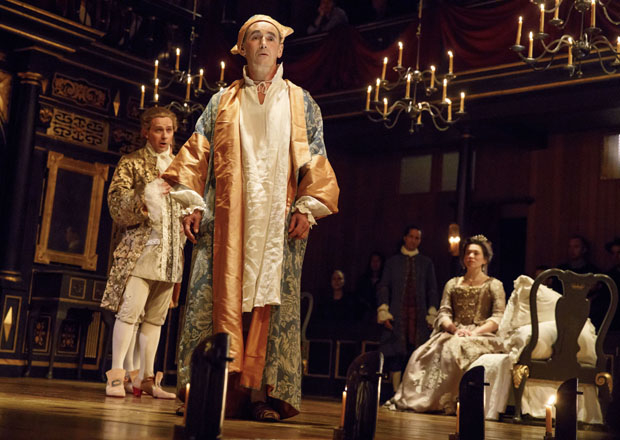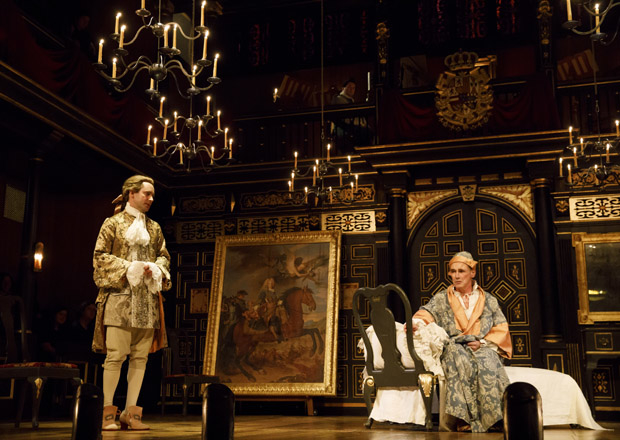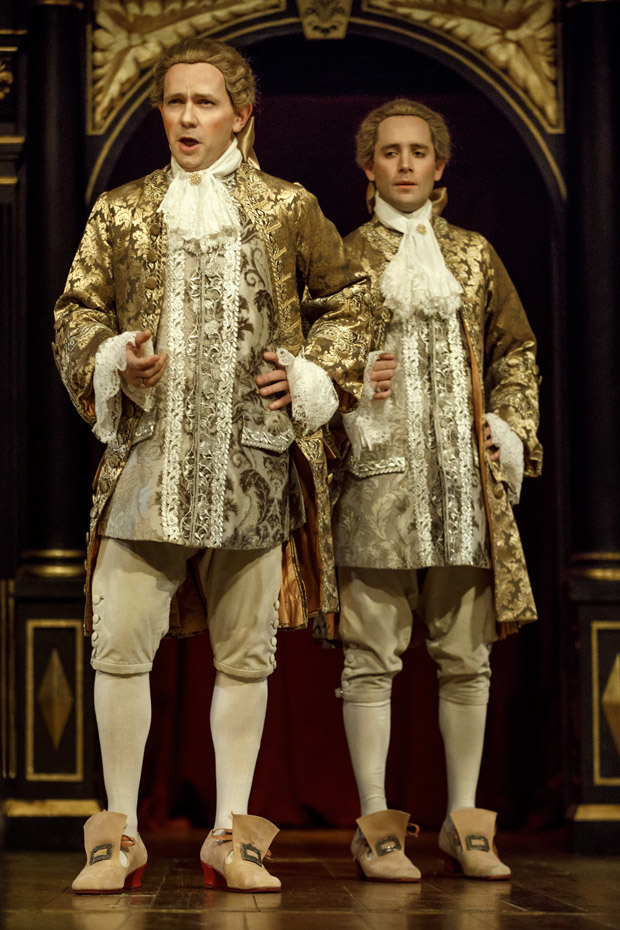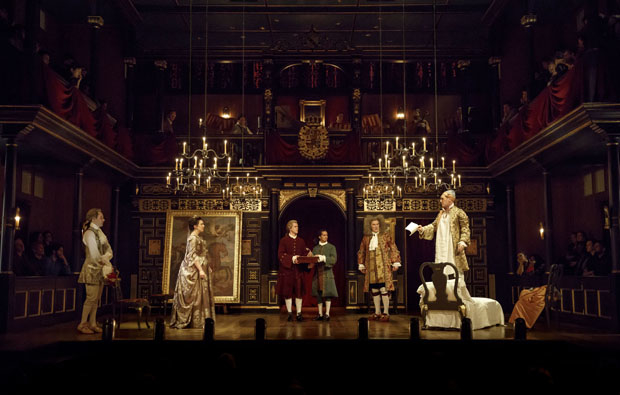Farinelli and the King

(© Joan Marcus)
Americans love royalty. The recent media frenzy over Prince Harry's American fiancée, Meghan Markle, is proof enough of that. As millions binge-watch The Crown on Netflix, Broadway audiences can experience a more exotic monarchy in Claire van Kampen's Farinelli and the King, now playing the Belasco Theatre after a 2015 run with Shakespeare's Globe in London. This historical drama concerns King Philippe V of Spain and his special relationship with Italian castrato Farinelli, a one-named wonder who was even bigger in the 18th century than Cher or Madonna are today. While Farinelli's career predates recording, vocalist Iestyn Davies thrillingly gives us a sense of what he might have sounded like, performing nine baroque arias in his soaring countertenor. You may come for the king, but you'll stay for Farinelli.
That king would be three-time Tony winner Mark Rylance, who is as close to theatrical royalty as they come (he's also married to the playwright). He plays the melancholic Philippe with a mixture of vulnerability and petulance that makes him feel palpable and modern, not at all the bewigged demigod astride a horse one sees in official portraits. We first encounter him wearing pajamas and holding a fishing rod over a goldfish bowl. "Perhaps they fed you before, just to trick me into believing you’re playing hard to catch," the king says to the fish, expressing his paranoia. Immediately, we know this isn't one of those glamorous royals who grace tabloid covers: At best, Philippe is Charles, conveying his strange and insulting sense of humor through constipated Received Pronunciation. At worst, he is violent, despondent, and completely unable to function.

(© Joan Marcus)
That is why his chief minister, Sebastian De La Cuadra (an appropriately stiff Edward Peel), wants him to abdicate. After insisting that she will not leave her husband's side, Queen Isabella (Melody Grove) nevertheless travels to London, where she is transfixed by Farinelli (Sam Crane performs the spoken scenes, while Davies sings). She offers impresario John Rich (a crusty Colin Hurley) a small fortune to take Farinelli back to Spain, sure that his angelic voice will help soothe the king's troubled soul — and it does. Given our monarchist predilections, it's no wonder that one of the biggest rounds of applause comes when the king, invigorated by Farinelli's music, reasserts his divine right by pointing out a budgeting error.
Such moments come standard in van Kampen's middling historical fiction: There's the requisite scene in which Philippe absurdly compares his selection as heir to the Spanish throne to Farinelli's castration at age 10. No mention is made of the fact that his accession accompanied the bloodiest European war in a generation, a fine reason to be depressed. Also overlooked is the brief reign of Philippe's son, whose untimely death brought the king out of early retirement, a return to power largely orchestrated by his politically savvy wife.

(© Joan Marcus)
Van Kampen eschews the typical (and possibly sexist) portrayal of Isabella as Lady Macbeth, opting instead for the even staler trope of the giving tree: Her every intention, action, and line is in relation to her husband (paging Alison Bechdel). Grove embodies Isabella with saintly tenderness, which is really her only option. Similarly, Crane amiably plays Farinelli as a devoted servant whose mere proximity to royalty helps him access his true self. A baffling attempt to insert conflict into the second act risks dramaturgical disaster, and is saved only by Davies's achingly beautiful interpretation of Handel's "Cara sposa."
Already a star in the opera world, Davies makes the most exhilarating Broadway debut of the year as the voice of Farinelli. We completely believe that his heavenly singing has coaxed the king out of his gloom, because it has the same effect on us. Music director and harpsichordist Robert Howarth expertly leads an orchestra of seven, offering Davies rich accompaniment. Director John Dove wisely places Davies onstage next to Crane during his singing scenes, suggesting an out-of-body experience while avoiding a potentially campy lip-synch. This is the foremost of many excellent decisions.
Dove's production is a total delight to the senses. The baroque opulence of Jonathan Fensom's set fits nicely in the Tiffany splendor of the Belasco. Plush red velvet curtains festoon the intricate woodwork of an onstage mezzanine built for both orchestra and audience. Accounting for a king who stayed up all night and slept all day, lighting designer Paul Russell magnificently bathes the stage in candlelight, shrewdly concealing modern instruments within the set. Extravagant period costumes (also by Fensom) pop against elaborately painted backdrops. It feels like an idyllic spectacle at the Palace of Versailles, where Philippe grew up.

(© Joan Marcus)
Such beauty can only partially ward off an ugly thought: For a man who reigns over half the world and can have anything in it, it is grotesque that the king can only find solace in a voice produced through genital mutilation. This play isn’t as much about the healing power of music as it is about a royal psychopath. Philippe afflicted Spain for 45 years. We should count ourselves lucky that our erratic heads of state cannot stick around past eight.











